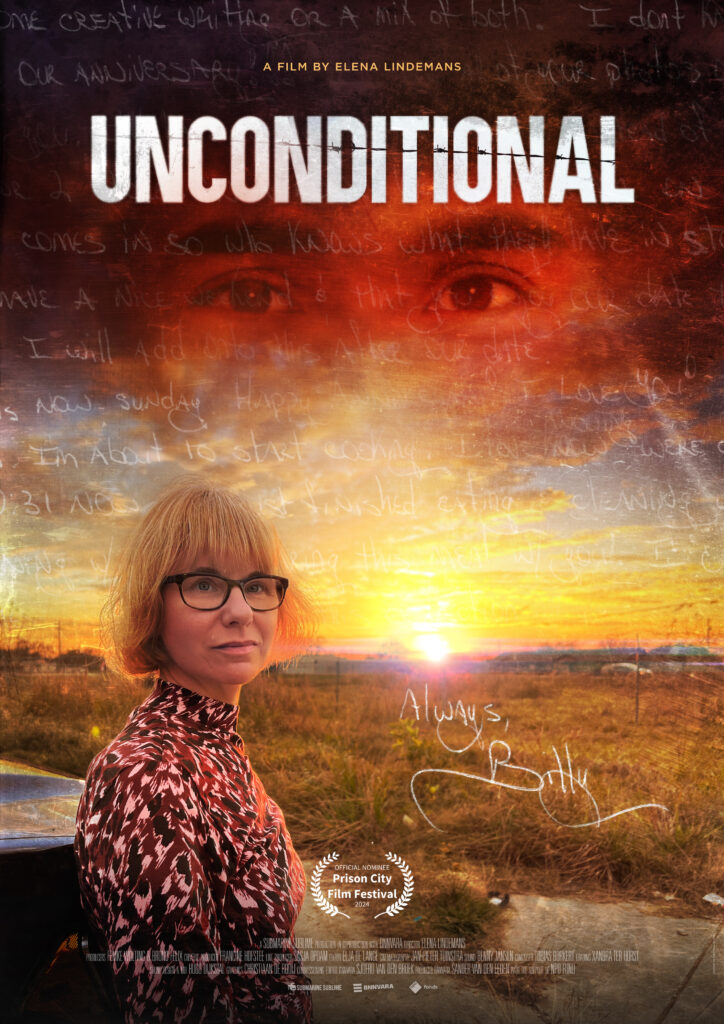Unconditional

When Dutch, introverted, and solitary Yolanda meets Billy, an American convict, through the website writeaprisoner.com, she falls madly in love. No man has ever been more open with her, wanting to know her, understand her, help her. But he is behind bars, and they can communicate only through the letters they send each other. From the outside, it is difficult to imagine how one could fall in love with someone serving a sentence for such a heinous crime. Yet the love between the two seems unconditional, even after Billy commits a murder in prison and ends up on death row.
Every year hundreds of women marry their American pen pal in prison, about a dozen of them are European. Relationships like Yolanda and Billy’s are full of roadblocks that would drive any modern- day relationship to its end. No physical contact, never being able to be together, not being able to speak to each other privately, no spontaneity, no vacations together and no one around who could be genuinely happy for you. On top of it all, Billy’s upcoming execution means that Yolanda will soon be on her own once again.
Unconditional is a psychological quest for love: If so little seems to be gained from love, why pursue it?
Elena Lindemans is a Dutch documentary director. Her first documentary was about her mother, who suffered with mental illness and, after a rejected euthanasia request, committed suicide. The documentary Moeders springen niet van flats (2014) won the Dutch Psyche Media-Award and prompted a hearing in the Dutch parliament. In addition, her documentary Ik heb het niet gedaan (2019) – about Romano van der Dussen who wrongfully spent 12 years in Spanish prison – was nominated for a Golden Calf at the Netherlands Film Festival.
More recently, Elena made a documentary series about the Dutch mental rehabilitation clinic for criminal offenders, called In de TBS (2023). In 2024, she will be releasing the series Een goede dood, where she follows six individuals trying to receive euthanasia due to endless psychological suffering.
This is a topic that really speaks to the imagination: women starting relationships with men who are locked up for serious and even gruesome crimes. I always wondered: what possesses them to do such a thing? What do they get out of it? Is it love? And if not love, then what is it?
Almost five years ago I met a Dutch woman named Yolanda. She perfectly matched the image that I had of these so-called death row dollies: a middle-aged single woman, who, out of curiosity but also out of loneliness, started writing to an American prisoner and after only a few letters fell head over heels for him. After a year, Yolanda and Billy married themselves behind glass.
Their entire love life, almost a decade now, has been playing out in the letters they write to each other. In essence, their love is much like how we know it from medieval times, a sort of “courtly love.” Their love life is platonic since the barriers between them can’t allow them to be physical. An unattainable love, one that could be considered ‘unconditional’.
Yolanda’s relationship with Billy is full of things which would not be sustainable in most modern-day relationships. No sex, enjoying time together or speaking in private, no vacations and no one around to be genuinely happy for you. And as if that wasn’t enough: Billy’s impending execution means that eventually Yolanda will be on her own again. In short, the sacrifices that Yolanda is willing to make for her love for Billy are far-reaching. What does it bring her? I, for one, can’t get away with calling Yolanda an eccentric or brushing her relationship with Billy off as an oddity. Because that would sell her short and wouldn’t do her story justice. I cannot conclude anything else other than that their love seems genuine.
In previous films, I already addressed topics that carry a certain taboo. Suicide, in the aforementioned Moeders springen niet van flats (2014). Men who are abused by women in Vrouw slaat man (2017), and fathers falsely accused of sexual abuse and/or assault that aren’t allowed to see their children in Verstoten Vaders (2020). Not to mention, the documentary series In de TBS (2023), which focuses on the ‘human’ behind the criminal who suffers from a mental disorder and their treatment.
It’s important for me to provoke nuanced conversations about these controversial topics. Onvoorwaardelijk (transl. Unconditional) has become a film about the price of love, and asks: “Is any love better than no love at all?” I want to hold up the mirror to the audience so they can question their own relationships.
